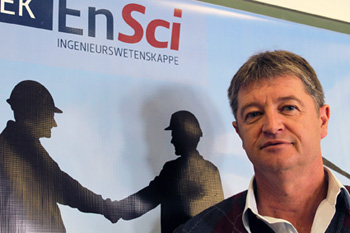Latest News Archive
Please select Category, Year, and then Month to display items
06 November 2023
|
Story MBALI MABOEA
|
Photo SUPPLIED
 The Department of Geography on the UFS Qwaqwa Campus recently played host to the Society of South African Geographers Conference (SSAG 2023), which gathered more than 100 students over three days.
The Department of Geography on the UFS Qwaqwa Campus recently played host to the Society of South African Geographers Conference (SSAG 2023), which gathered more than 100 students over three days.
Fostering academic growth, collaboration, and inspiration among students and researchers in the field of geography, the Department of Geography on the UFS Qwaqwa Campus recently played host to the Society of South African Geographers Conference (SSAG 2023), which gathered more than 100 students over three days.
Following a five-year hiatus, the three-day conference comprised student proposal presentations in different fields: human geography, environment geography, geoinformatics, and physical geography, divided into breakaway sessions over two days. Furthermore, day three of the annual conference included an excursion to the Basotho Cultural Village and Clarens.
The three-day annual student conference focused on different themes presented by two main speakers. The topic of the first keynote speaker, Dr Mahlomola Daemane, General Manager of the SANParks Arid Research Unit, focused on the contemporary conservation, transition, and relevance of science in policy and decision making.
The second keynote speaker was Dr Felicia Akinyemi, a Marie Sklodowska-Curie Research Fellow affiliated with the Institute of Geography at the University of Bern in Switzerland. Her work focuses on the intersection of geoinformatics, global change, and sustainability. Dr Akinyemi focused her talk on the integrative geospatial methods and metrics for sustainable land use. She introduced different techniques and metrics and gave students insight in early-career African research.
Speaking about the success of the conference, Nthebohiseng Sekhele, Geography Lecturer on the Qwaqwa Campus and chair of the organising committee, said, “The local organising committee was also very impressed with the quality of presentations from our postgraduate students in Geography, as well as the robust discussions that happened during the parallel sessions in the two days of the conference. We had a positive response of physical and online participation from many universities across South Africa. We are pleased that we have achieved our goal with this conference, which is to inspire the next generation of geographers.”
UFS provides an alternative route to a BEng degree
2014-06-04
 Mr Louis Lagrange Mr Louis Lagrange
Photo: Leonie Bolleurs |
The university is very excited about the establishment of a new study field at Kovsies – a BSc degree with majors in Physics and Engineering subjects. The course is presented in the Faculty of Natural and Agricultural Sciences on the Bloemfontein Campus.
Project EnSci was established at the UFS at the beginning of 2014. Twelve first-years and four second-years enrolled for the course this year.
“We replace the non-core Physics subjects with Engineering subjects. We also present all specialist Engineering subjects ourselves,” says Louis Lagrange, project manager of Projec EnSci – Engineering Science.
“There isn’t enough space at universities in South Africa to accommodate all students who are interested in engineering. The UFS course can thus be considered a fundamental engineering course. It equips a student in such a way that they will be able to specialise in various disciplines,” he says.
After completion of the three-year BSc degree at the UFS, students may choose to:
• graduate with a BSc degree majoring in Physics and Engineering subjects and enter the professional world.
• study further for an honours, master’s or doctoral degree in Physics.
• apply to register for a second degree – BEng or BScEng (for two additional years) at another university recognising the BSc degree with majors in Physics and Engineering Science. Acceptance is subject to certain requirements.
Matriculants interested in this field, must follow the application procedure of the UFS before 30 September 2014 and achieve the following in the final NSC or equivalent examination:
• an AP score of 34 or more is strongly recommended,
• cumulative AP score of 13 or more in Mathematics and Physical Science,
• completion of NBT tests and
• language of instruction – 4 or more.
These prospective students also need to complete and submit an application form. For more information contact us at engineeringsubjects@ufs.ac.za